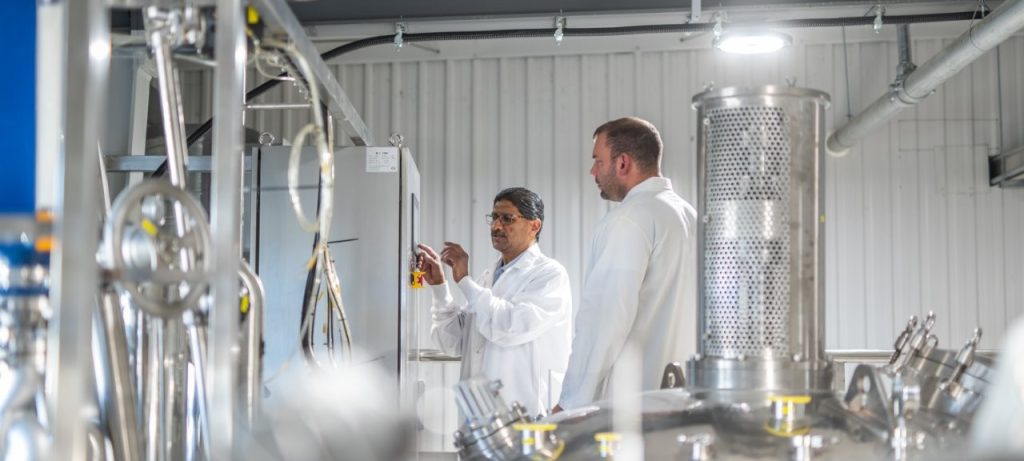In recent years, the food industry has undergone a significant transformation, with consumers prioritizing sustainable sourcing, nutritional quality, and health benefits. As demand for minimally processed foods with fewer chemical preservatives grows, fermentation has emerged as a viable solution to meet these evolving preferences.
Recognizing this shift, the Saskatchewan Food Industry Development Centre (Food Centre) leveraged its 25 years of expertise to expand its services and support startups and small-to-medium enterprises (SMEs) seeking fermentation expertise and facility for commercialization. Already established in product development, plant-based proteins, extrusion, and ingredient science, the Food Centre introduced its Advanced Food Ingredients Centre—designed to accommodate the rising demand for fermented food products by offering process development, optimization, and ready-to-market solutions.
Addressing Industry Gaps in Fermentation
Despite Canada’s thriving food industry, a shortage of fermentation facilities for process optimization and scale-up remains a critical challenge. A recent survey conducted by Protein Industries Canada, alongside agri-food partners like the University of Saskatchewan, AgWest-Bio, and the Global Agri-Food Advancement Partnership, identified key gaps in fermentation capabilities. These include:
- Limited access to scale-up facilities
- A shortage of highly qualified personnel
- Restricted funding for research and commercialization
- Absence of a national fermentation consortium
The Food Centre’s new facility seeks to close these gaps by collaborating with the University of Saskatchewan to educate and train graduate students in fermentation techniques, supporting startups and SMEs with product development, and assisting businesses in securing funding when possible. Additionally, the Centre pursues research initiatives that enhance industry capacity, generating new product innovations while leveraging Saskatchewan’s abundant agri-food resources.
Facility Capabilities and Technologies
Set for completion in Fall of 2025, the fermentation facility will house an impressive range of fermenter capacities—from 10 liters to 2 x 10,000 liters—with intermediate sizes of 50, 200 and 1,000 liters. Currently, the 10 and 50 liter fermenters are operational, facilitating several client and internal projects. In addition to submerged fermentation techniques, the facility will incorporate pilot-scale solid-state fermentation with a 300 kg fermenter and in-house proof-of-concept testing for smaller batches (2–10 kg) before pilot-scale production.
To support large-scale fermentation, the facility will feature advanced downstream processing equipment, including:
- Filtration systems (micro, ultra, and nano)
- Centrifuges and decanters for biomass separation
- Pasteurization technologies (high-temperature short-time processing, jet cooking, high/low-pressure injection)
- Drying systems, such as spray dryers (25–200 kg/h evaporative capacity), vacuum microwave drying, roller dryers, and fluidized bed dryers
Diverse Applications Beyond Food & Beverage
While food and beverage fermentation remains a primary focus, the Food Centre’s facility is equipped to support broader applications, including:
- Crop inoculants (biofertilizers, biocontrol agents)
- Biopolymers and industrial bioproducts
To ensure seamless transitions between different project types, the facility enforces rigorous change-over procedures that meet food safety regulatory standards. It will operate under Biosafety Risk Level 1 conditions, allowing for genetically modified microorganism (GMO) fermentation under strict containment measures. Following any GMO-related projects, comprehensive decontamination procedures will be implemented to verify the absence of residual GMO materials.
The facility’s CFIA, BRC, and FDA certifications will provide clients with the necessary credentials to market their products internationally while maintaining superior safety and quality standards.
Supporting Industry Through Business & Sustainability Strategies
Beyond technical support, the Food Centre extends its expertise to techno-economic analyses, helping clients maximize their return on investment in fermentation ventures. This includes evaluations of:
- Capital expenditure (CAPEX) and operational costs (OPEX)
- Profitability assessments and process optimization strategies
- Debottlenecking approaches for production scale-up
Additionally, process simulation modeling will be available for various batch and continuous operations, helping businesses determine optimal scale-up and scale-down scenarios.
Recognizing the increasing emphasis on sustainability, the Food Centre also provides life-cycle analysis solutions, offering environmental impact assessments and sustainability reporting. These efforts align with growing industry and consumer interest in eco-conscious product development, helping clients refine their offerings to meet sustainable production standards.
Looking Ahead
With its new fermentation capabilities, the Food Centre is set to transform the industry landscape, offering invaluable support to startups, SMEs, and established businesses aiming to develop and commercialize fermented products. Through advanced processing technologies, research collaborations, and sustainability initiatives, the facility will help position Canada as a leader in fermentation innovation—one that meets the demands of today’s evolving market while unlocking new possibilities for food, beverage, and industrial applications.
Article credit:
Pooba S. Ganeshan, BSc, MSc, MPhil, PhD
Principal Scientist, Fermentation & Bioengineering, Saskatchewan Food Industry Development Centre (Food Centre)
Adjunct Professor, Department of Food and Bioproduct Sciences, University of Saskatchewan
Thank you to Saskatchewan Food Industry Development Centre inc. for submitting the article and photos.
